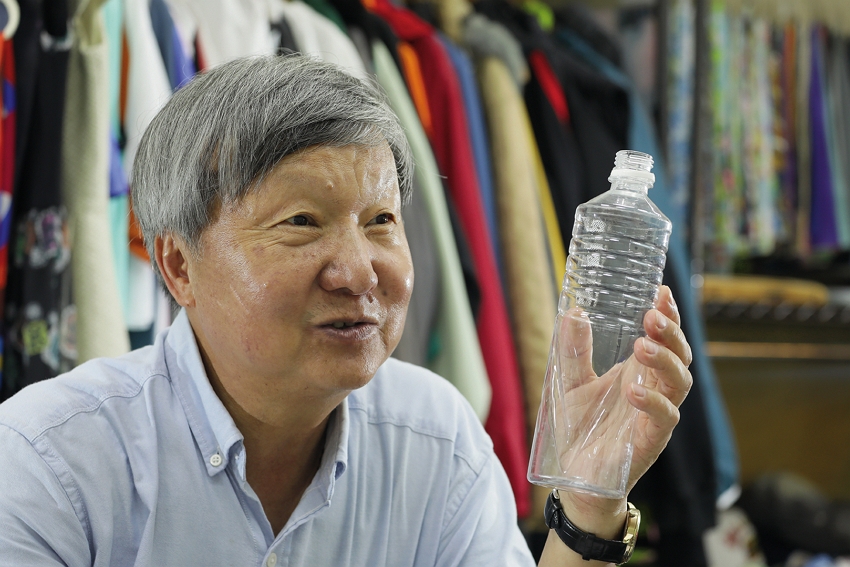
In a spirit of social responsibility, Mark Ke has dedicated himself to the development of eco-friendly textiles.
In 1993 Ecomax Textile Company produced Taiwan’s first recycled polyethylene terephthalate (PET) fiber, which they called PETSPUN®. Other textile companies quickly followed suit, and today recycled PET fiber is commonly used in daily life. Major international sportswear brands widely use recycled PET fiber produced in Taiwan, enabling Taiwan’s textile sector, once considered a sunset industry, to gain a new lease on life.
Over the last 20-plus years Ecomax has developed all manner of eco-friendly materials, including fibers enhanced with materials recycled from rice husks and sorghum distiller’s grains, as well as artificial leather made with interlayer resin recovered from laminated automobile windshields. In recent years the company has led the world in developing recycled fiber from discarded ocean fishing nets. Ecomax aims to bring Taiwan’s “green miracle” to the attention of the world.
In the showroom at Ecomax Textile Company, everything you see—from T-shirts to tote bags to stuffed polar bears—is made with fiber from recycled PET bottles. “The seat you are sitting on, the sofa next to you, the pillows, and even the lining inside this commemorative World Cup soccer ball are all made from our PETSPUN fiber!” So says Mark Ke, managing director of Ecomax and second-generation heir to the company.
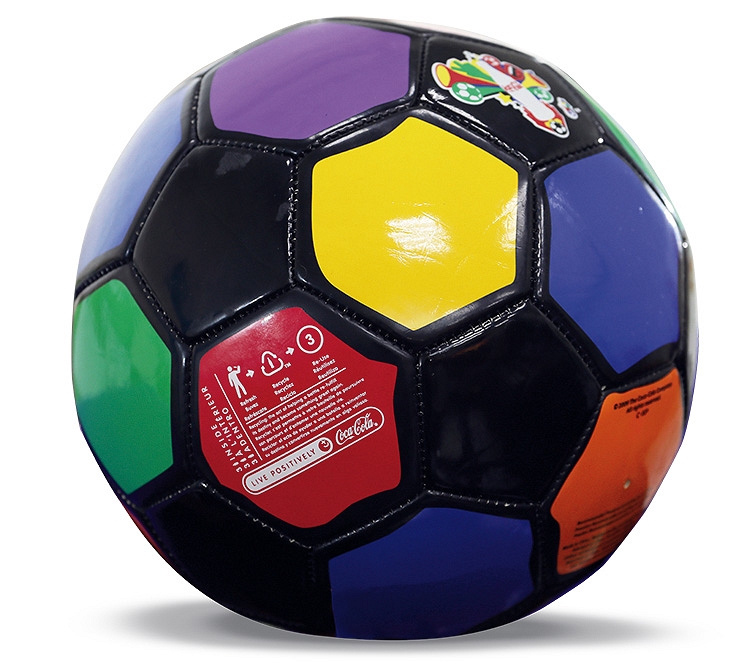
This commemorative World Cup soccer ball has a reinforcing lining made from Ecomax’s PETSPUN recycled PET fiber.
Taiwan’s first recycled PET fiber
Ecomax is located in Changhua County’s Shengang Township, next door to Hemei Township, which is known as “the hometown of the Weaver Girl” (a figure from Chinese folk culture). This area was once a bastion of the textile industry in Taiwan. But in the 1990s many Taiwanese firms relocated abroad, and textile factories in Changhua closed one after the other. Ecomax was one of the few companies that stayed.
Ecomax was founded in 1968 by Mark Ke’s father, former managing director Ko King-xi, and specialized in weaving fabric from the artificial fiber rayon. Mark Ke grew up surrounded by the textile production process and textile technology, and joined the management team at his father’s firm after he completed his military service. The story of Ecomax’s transformation from a traditional textile factory into an internationally respected eco-friendly textile brand started, quite by accident, when Ke heard a speech by Dharma Master Cheng Yen, founder of the Buddhist Compassion Relief Tzu Chi Foundation.
“I watched as the small figure onstage softly said, ‘I ask all of you to use the hands you are applauding with to protect the environment.’” These words deeply moved Mark Ke and changed his life. At that moment he vowed to himself: “For the rest of my life I will follow in the footsteps of the Dharma Master.”

Each step in the recycling of PET bottles poses technological challenges.
But how could textile manufacturing be combined with environmental protection? This question remained constantly on Ke’s mind, until he happened to read an article in an in-flight magazine about how American brand-name jeans were being made out of recycled PET plastic bottles. This sparked his curiosity and gave him a direction for the environmental protection that he had been thinking so hard about. Ke, who knew nothing at all about processing plastics, did in-depth study of the subject. Just as many other textile firms were relocating abroad to reduce costs, Ke went against the trend by investing great amounts of time and capital in Taiwan to develop novel technology, a decision that his father found difficult to understand. Facing many challenges, Mark Ke says: “Looking back, there were times when I had to hold back my tears; it was really tough.” But he was determined to show the world that Taiwan could do it too.
At each step in the production process—from separating out PET bottles from other plastic waste, washing them, shredding them, and melting them into polyester chips, to drawing polyester filament, spinning it into yarn and weaving the yarn into fabric—Ke sought out the technologies needed to develop recycled PET fiber. Finally, after three years of effort, in 1993 Ecomax successfully developed Taiwan’s first recycled PET fiber, and registered the trademark “PETSPUN” to market it.
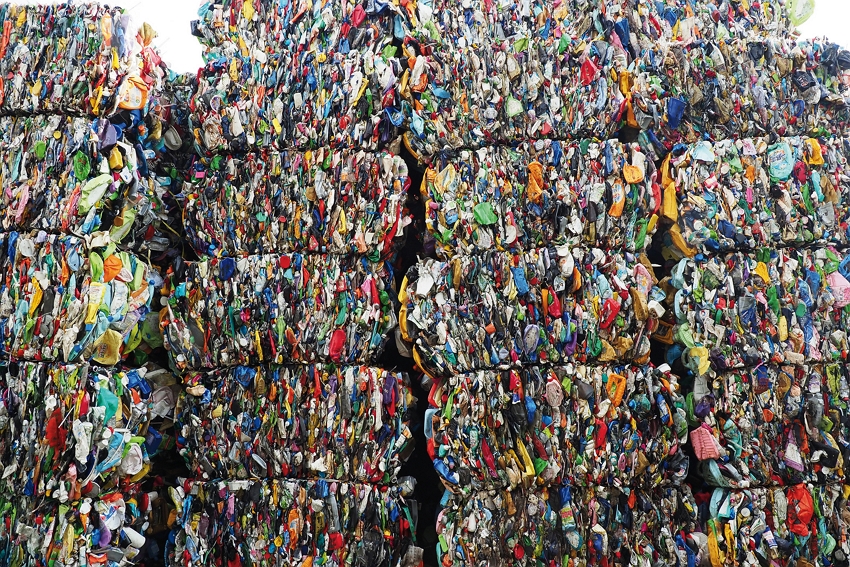
Taiwan has first-class recycling technology: discarded plastic bottles made from various materials can all be manufactured into useful items.
Finding fame in the UK
But it was not all plain sailing for Ecomax after the successful development of PETSPUN. Every step in the production process posed technological challenges. Taking just washing the used PET bottles as an example, this has to be done repeatedly in order to be able to produce polyester chips free of impurities from which to make the slender yarn. This lengthened the time needed for the production process and raised the technological bar very high, so that costs were one-third higher than for polyester fiber made from new raw materials. This higher cost caused many potential clients to hang back.
“This lasted right up until the chairman of the UK department store chain Marks and Spencer appeared on the scene.” Ke relates that as soon as the British firm heard that Taiwan was producing recycled PET fiber, they sent a representative to Changhua to discuss opportunities for cooperation. “In European countries, the concept of corporate social responsibility got established earlier than elsewhere, so companies are more willing to accept higher costs in order to do their bit for the environment,” adds Ke’s eldest daughter, Anita Ke, who is part of the management team at Ecomax.
Later, Marks and Spencer’s chairman appeared on a BBC news program wearing apparel made of 100% PETSPUN, and announced the adoption of a five-year plan to promote eco-friendly products. From then on, all the clothes in a 40-foot shipping container would be snapped up as soon as they hit the shelves in the UK, which gave Ecomax the chance to turn a profit.
Ecomax’s success attracted other textile makers in Taiwan to follow suit. Some asked Mark Ke for information about the technology involved while others used Ecomax products to manufacture end-user products. Also, many of the eco-friendly products used by Tzu Chi in disaster relief were produced by Ecomax. Taiwan’s recycled PET fiber has become a world leader in terms of both quality and quantity. More than half of all clothing made from recycled PET fiber worldwide uses products made by Taiwanese brands.
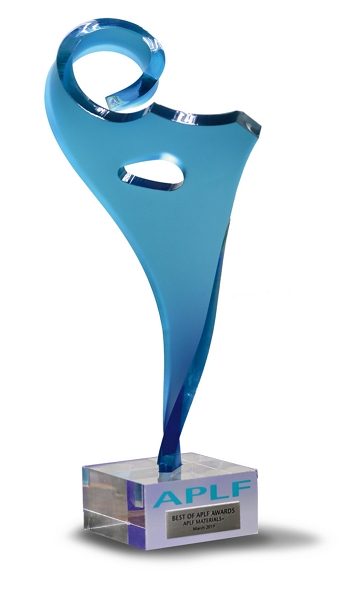
Ecomax’s artificial leather, made by combining recycled resin from laminated safety glass with eco-friendly fabric, won “Best Sustainable Material Collection” in the Best of APFL Awards at the 2019 Asia Pacific Leather Fair.
Amazing transformations
Actually Ecomax only got its English name in the year 2000. With the company’s focus now firmly on the development of eco-friendly recycled fibers and products, Mark Ke hoped that Ecomax could devote maximum effort to protecting the environment.
Ke started researching ways to use various waste materials, such as sorghum distiller’s grains, rice husks, and oyster shells, to produce substances that can be added to PETSPUN to change its properties. He hoped that in this way, the materials could be brought back into use in new forms, rather than being discarded.
Ke takes carbonized rice husks from biomass power generation, distiller’s grains from sorghum spirit production, and oyster shells from oyster farming. The sorghum grains and oyster shells undergo further thermal processing, and the three materials are crushed into nanoparticles, which are added to the polyester chips made from recycled PET bottles. The chips are molten to produce a “three-in-one” fiber that Ecomax manufactures into products such as light summer quilts. Sorghum grains and rice husks both contain silicon dioxide, which makes textile products moisture absorbent and deodorizing, and emits far infrared rays. Meanwhile, oyster shells are rich in calcium carbonate, which becomes calcium oxide through calcination. Research has shown that calcium oxide has antimicrobial effects.
Ecomax has always been proud of the fact that its products are “Made in Taiwan.” After many years of effort, Ecomax has a fully integrated production chain, and is dedicated to manufacturing high-quality products. For example, the company combines polyvinyl butyral from scrap automobile windshields with eco-friendly fabric to make artificial leather, for which Ecomax won the “Best Sustainable Material Collection” award at the 2019 Asia Pacific Leather Fair.
Laminated safety glass, as used in automobile windshields, is made using two sheets of glass that are bonded together by a clear resin interlayer made of a plastic material called polyvinyl butyrate (PVB). When vehicles are scrapped, this material is usually incinerated or sent to landfill. But Ecomax has developed processes to separate out and purify PVB and coat it onto eco-friendly fabric to make artificial leather, which is embossed and used in a wide range of products. This environmentally friendly product can be substituted for animal-skin leather, ensuring that fewer animals will be killed.
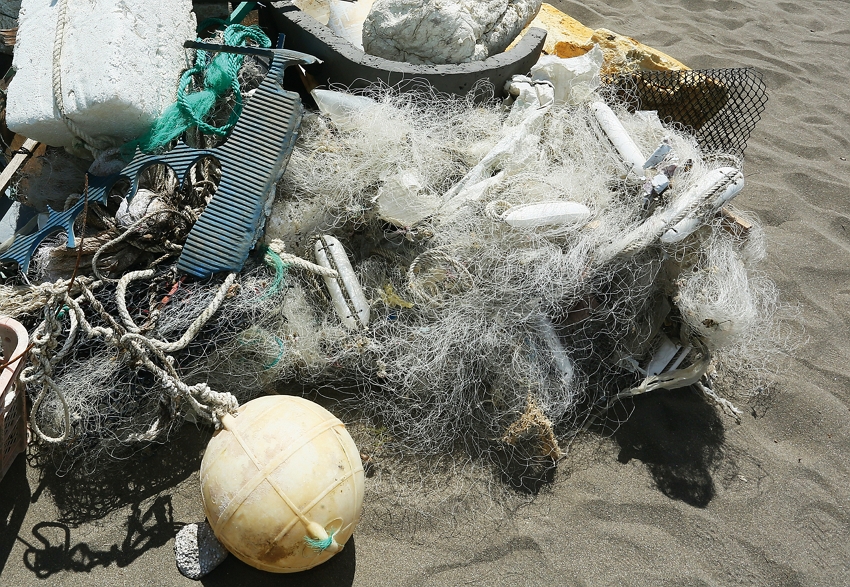
Mark Ke cares about the Earth, and is leading the way in developing fiber made from recycled fishing nets. He hopes that in future the seas around Taiwan will be pristine and beautiful, for all to enjoy.
World leader in fishing-net fiber
Ecomax’s factory is powered by solar panels and its toilets are flushed with collected rainwater. The company also recommends that clients should use fabrics in their natural colors, but if a client really wants other colors, they should use digital printing rather than dye, greatly reducing water use. When Ecomax employees leave home they always carry their own travel mugs, and although Mark Ke comes into contact with PET bottles every day, he says with a laugh that he has not consumed a bottled drink in many years. For Ecomax, eco-friendliness is a philosophy of life that has been internalized by everyone who works there.
A few years ago Ke saw a documentary about how the deep-sea fishing industry is destroying the ocean ecology, and since then he has studied the issue of marine trash in depth. In 2013, Ecomax began research into recycling discarded fishing nets to make textile fiber. The nets, which are heavily contaminated with tar and saturated with sea salt, need to be cleaned over and over again in a complex and time-consuming process before the fibers are clean enough to be made into yarn.
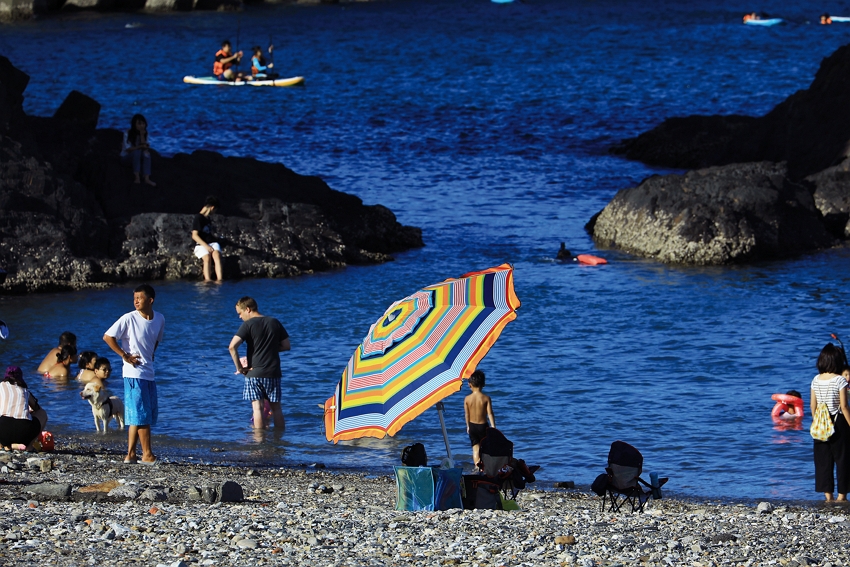
Mark Ke cares about the Earth, and is leading the way in developing fiber made from recycled fishing nets. He hopes that in future the seas around Taiwan will be pristine and beautiful, for all to enjoy. (photo by Jimmy Lin)
Finally in 2015 Ecomax successfully developed recycled fishing net fiber, which it uses in bags and apparel. Recently Mark Ke visited various fishing harbors along Taiwan’s west coast and talked with fishermen, appealing to them to not dump fishing nets in the ocean. “We are the first company to make fiber from recycled ocean waste. Next we want to support beach-cleaning activities and educate the public so that our coastline can be restored to its former beauty,” says Ke. “One day people from around the world will make pilgrimages to this ‘pure land’ of Taiwan.”
Ke’s eyes shine brightly as he tells the story of the development of each kind of material. Although he could not know whether his path would lead to success or failure, the direction of travel was always clear. With a spirit of social responsibility, Ecomax is leading the way in manufacturing eco-friendly textiles, and awakening the public to the boundless possibilities of “green” textile products.











